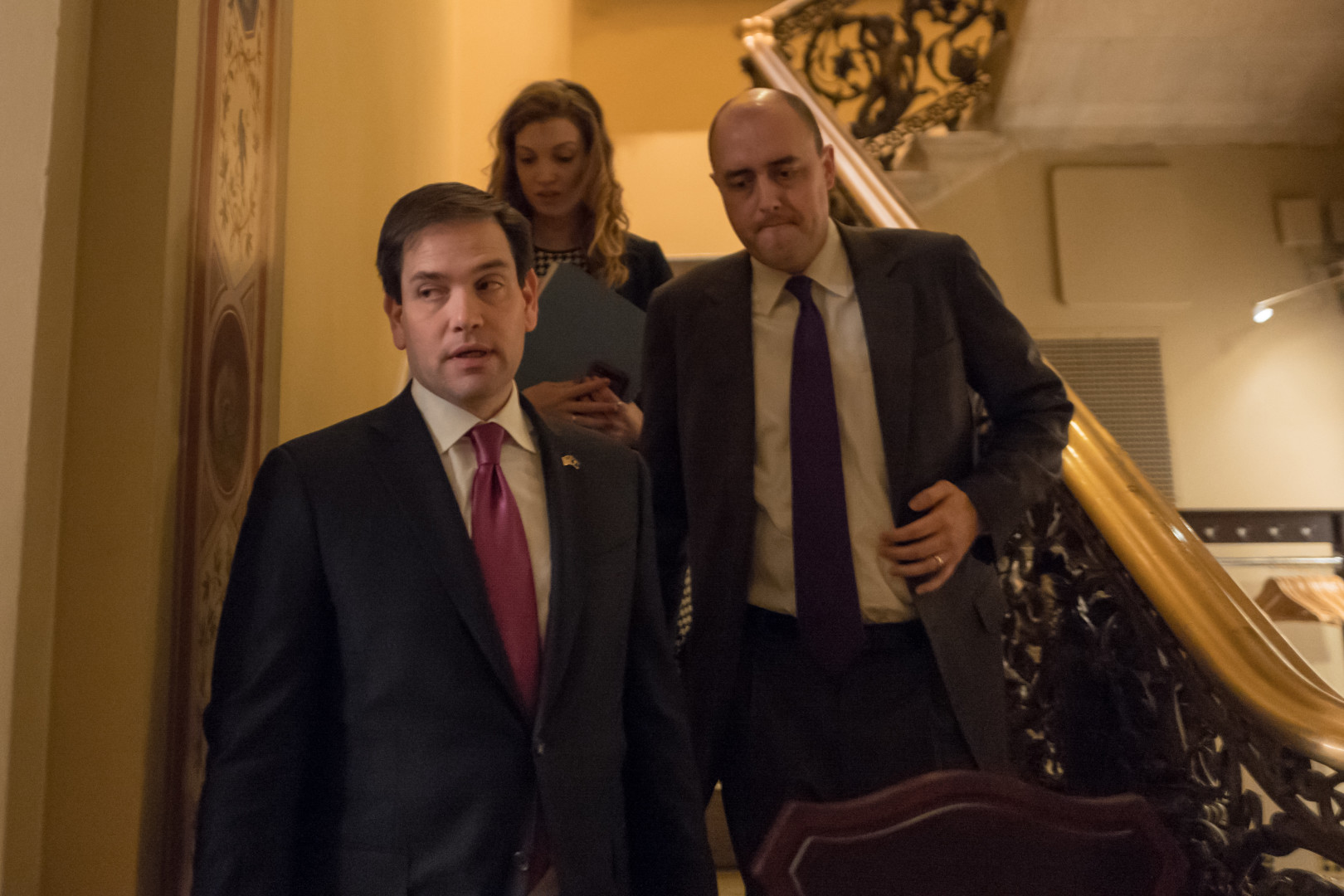Voters in a dozen states across the country on Tuesday set Democrat Hillary Clinton on a clearer path to her party’s presidential nomination, while Republicans appeared poised to continue their poisonous primary battle for weeks — or months — to come.
By 11 p.m. Eastern, Clinton had won eight of the 12 Democratic Super Tuesday contests, compared with four states that backed Sen. Bernie Sanders (I-Vt.).
Early results showed Clinton had won at least 335 pledged delegates to the Democratic National Convention this summer. Sanders had won at least 145. And while hundreds of delegates have yet to be allocated, Clinton’s performance on Tuesday will put her well ahead of her more liberal challenger going into a more national phase of the election.
At the same time, Republican voters handed real estate mogul Donald Trump significant wins in at least six of 11 states up for grabs on Tuesday, while Sens. Ted Cruz (R-Texas) and Marco Rubio (R-Fla.) continued feuding over the second-place mantle. Cruz won two states, home-state Texas and neighboring Oklahoma, while Rubio won his first contest, Minnesota’s caucuses.
The results, as both Cruz and Rubio campaigns acknowledged, appear to guarantee an ongoing divisive and bloody race for second place behind Trump.
“Tomorrow morning, we have a choice. So long as the field remains divided, Donald Trump’s path to the nomination remains more likely. And that would be a disaster for Republicans. For conservatives. And for the nation,” Cruz said in an election-night address to supporters. Cruz asked his opponents to “prayerfully consider our coming together, united.”
Tuesday’s results were decidedly better for Cruz, who will emerge with significantly more delegates than Rubio, while the Florida senator struggled to manage expectations. As late as Tuesday afternoon, Rubio’s team was privately assuring supporters it would be competitive in as many as four states; ultimately, they won only one. Trump, targeted by Rubio as the Republican race has devolved into a school-yard taunting match, made a point to single out his young rival in a victory speech-turned-press conference.
“I know it was a tough night for Marco Rubio. He had a very tough night,” Trump said at a victory event at his Florida estate Mar-a-Lago. “He didn’t win anything. He hasn’t won anything, period,” Trump said, before Minnesota’s results were finalized.
Exit polls demonstrated a deeply divided Republican Party, riven by factions split among those who want an experienced president and those who want an outsider to change the system.
About half of voters in states such as Virginia, Oklahoma and Arkansas — states that were most closely contested on Tuesday — said they wanted an outsider representing the GOP; Trump won more than half of those voters. Trump also won a plurality of voters who said they were most interested in change, while Cruz and Rubio split among voters more interested in an experienced candidate.
Trump continues to benefit from a coalition of low income, low education voters who decided months ago to back the erstwhile reality show star. Trump performed disproportionally well among voters without college degrees in states across the Super Tuesday map; he took 53 percent among non-college Republicans in Alabama, where a majority of Republican voters do not have college degrees, and 59 percent among those without degrees in well-educated Massachusetts.
Trump also did best among those on the lower end of the economic spectrum, and those voters who said they decided on their candidate weeks or months before election day. Rubio, Cruz and, in a handful of states, Kasich all performed better among voters who said they had only recently decided whom to support.
Cruz’s win in Oklahoma, Rubio’s victory in Minnesota and Ohio Gov. John Kasich’s close finish in Vermont all but guarantees the Republican field will remain crowded going forward. No candidate performed poorly enough to be forced from the race, a scenario that benefits the candidate who does best in a divided field — Trump.
On the Democratic side, Clinton continued her domination among the voters who make up the strongest pillars of the Democratic coalition: minorities and older voters. Clinton won African American voters by at least 50 percentage points — and by as much as 80 points in Arkansas and Alabama — in every state where those voters made up a significant slice of the Democratic electorate on Tuesday. In liberal Massachusetts, she won voters over the age of 65 by 21 points; in conservative Arkansas, she won those voters by more than 60 points.
But while Clinton took a big step toward the Democratic nomination, exit polls pointed to her continuing vulnerability. In every state that held a contest on Tuesday, Clinton won by huge margins among those who said they were looking for a candidate either with the right experience or who would be most electable in November.
Sanders, though, has continued to win among voters who say they are looking for a candidate who either cares about them or who are most honest and trustworthy. A shocking number of Democrats — including 52 percent in Oklahoma and 43 percent in liberal Massachusetts — said Clinton was not honest or trustworthy.
Still, Clinton turned her attention almost entirely to the Republican field, rather than to her more immediate opponent Sanders.
“I believe what we need in America today is more love and kindness,” the Democratic front-runner said, previewing a stark contrast with doom-and-gloom Trump. “Instead of building walls, we’re going to break down barriers and build ladders of opportunity and empowerment, so every American can live up to his or her potential.”
While Super Tuesday represented the single most significant day of the Democratic and Republican nominating contests, both parties now face an increasingly rapid series of contests. On the Republican side, four states — — Kansas, Kentucky, Louisiana and Maine — vote on Saturday, while Hawaii, Idaho, Michigan and Mississippi vote next Tuesday. Democrats vote in Kansas, Louisiana and Nebraska on Saturday; Maine on Sunday; and Michigan and Mississippi on Tuesday.

